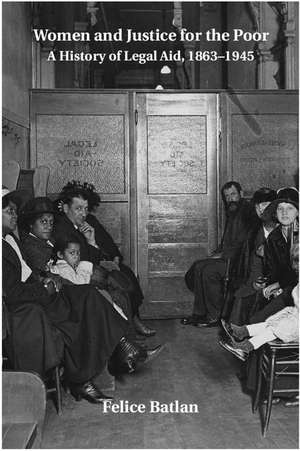Women and Justice for the Poor: A History of Legal Aid, 1863–1945: Studies in Legal History
Autor Felice Batlanen Limba Engleză Hardback – 4 mai 2015
Din seria Studies in Legal History
-
 Preț: 200.36 lei
Preț: 200.36 lei - 11%
 Preț: 692.50 lei
Preț: 692.50 lei -
 Preț: 199.95 lei
Preț: 199.95 lei -
 Preț: 202.52 lei
Preț: 202.52 lei -
 Preț: 424.34 lei
Preț: 424.34 lei -
 Preț: 492.83 lei
Preț: 492.83 lei -
 Preț: 180.87 lei
Preț: 180.87 lei -
 Preț: 484.56 lei
Preț: 484.56 lei -
 Preț: 233.69 lei
Preț: 233.69 lei - 9%
 Preț: 663.99 lei
Preț: 663.99 lei -
 Preț: 187.82 lei
Preț: 187.82 lei -
 Preț: 422.02 lei
Preț: 422.02 lei -
 Preț: 376.31 lei
Preț: 376.31 lei -
 Preț: 494.74 lei
Preț: 494.74 lei -
 Preț: 488.22 lei
Preț: 488.22 lei -
 Preț: 192.94 lei
Preț: 192.94 lei -
 Preț: 126.60 lei
Preț: 126.60 lei -
 Preț: 373.86 lei
Preț: 373.86 lei -
 Preț: 210.99 lei
Preț: 210.99 lei -
 Preț: 114.42 lei
Preț: 114.42 lei -
 Preț: 233.26 lei
Preț: 233.26 lei -
 Preț: 373.92 lei
Preț: 373.92 lei -
 Preț: 237.74 lei
Preț: 237.74 lei -
 Preț: 419.97 lei
Preț: 419.97 lei -
 Preț: 301.82 lei
Preț: 301.82 lei -
 Preț: 315.02 lei
Preț: 315.02 lei - 14%
 Preț: 793.30 lei
Preț: 793.30 lei -
 Preț: 321.90 lei
Preț: 321.90 lei -
 Preț: 441.43 lei
Preț: 441.43 lei -
 Preț: 308.45 lei
Preț: 308.45 lei -
 Preț: 411.48 lei
Preț: 411.48 lei - 11%
 Preț: 697.28 lei
Preț: 697.28 lei -
 Preț: 434.89 lei
Preț: 434.89 lei -
 Preț: 430.17 lei
Preț: 430.17 lei -
 Preț: 307.68 lei
Preț: 307.68 lei -
 Preț: 246.40 lei
Preț: 246.40 lei -
 Preț: 427.04 lei
Preț: 427.04 lei - 14%
 Preț: 755.02 lei
Preț: 755.02 lei -
 Preț: 302.89 lei
Preț: 302.89 lei -
 Preț: 305.39 lei
Preț: 305.39 lei -
 Preț: 314.81 lei
Preț: 314.81 lei
Preț: 696.96 lei
Preț vechi: 810.42 lei
-14% Nou
Puncte Express: 1045
Preț estimativ în valută:
133.36€ • 139.61$ • 110.35£
133.36€ • 139.61$ • 110.35£
Carte tipărită la comandă
Livrare economică 07-21 aprilie
Preluare comenzi: 021 569.72.76
Specificații
ISBN-13: 9781107084537
ISBN-10: 1107084539
Pagini: 250
Ilustrații: 7 b/w illus.
Dimensiuni: 150 x 231 x 23 mm
Greutate: 0.5 kg
Editura: Cambridge University Press
Colecția Cambridge University Press
Seria Studies in Legal History
Locul publicării:New York, United States
ISBN-10: 1107084539
Pagini: 250
Ilustrații: 7 b/w illus.
Dimensiuni: 150 x 231 x 23 mm
Greutate: 0.5 kg
Editura: Cambridge University Press
Colecția Cambridge University Press
Seria Studies in Legal History
Locul publicării:New York, United States
Cuprins
Introduction; Part I. A Female Dominion of Legal Aid, 1863–1910: 1. The origins of legal aid; 2. The Chicago experience: the maturation of women's legal aid; Part II. The Professionalization of Legal Aid, 1890–1921: 3. Of immigrants, sailors, and servants: the Legal Aid Society of New York; 4. Reinventing legal aid; Part III. Dialogues: Lawyers and Social Workers, 1921–45: 5. Constellations of justice; 6. Compromises; Conclusion.
Recenzii
'Women and Justice for the Poor is an exciting and timely intervention into work on lawyering in the United States. Batlan establishes the deep relevance of ideas about gender and race to the history of law and legal practice through ambitious research, provocative analysis, and engaging narrative.' Martha S. Jones, Arthur F. Thurnau Professor, University of Michigan
'By tracking legal aid through the winding corridors of urban social institutions, Batlan gives us evocative insights into gender, reform, capitalism, and lawyering in a cogent and fascinating historical account. Her erosion of lay and professional boundaries, demonstrated by women's contribution to legal aid and the pragmatic relief they provided to underprivileged clients, illuminates the value of using gender to frame the story.' Norma Basch, Professor Emeritus, Rutgers University
'In a remarkably original social/legal history, Batlan is asking readers to rethink what lawyering has meant and could mean. And when you ask 'outside the box' questions, you come up with surprising answers. This book can help us understand why law today can be far from justice.' Linda Gordon, Florence Kelley Professor of History, New York University
'Women and Justice for the Poor presents research that is definitely worth reading. Batlan succeeds in exploiting science history to show convincingly how women played a significant role in legal aid history.' Marianne Vasara-Aaltonen, Kirjallisuutta
'By tracking legal aid through the winding corridors of urban social institutions, Batlan gives us evocative insights into gender, reform, capitalism, and lawyering in a cogent and fascinating historical account. Her erosion of lay and professional boundaries, demonstrated by women's contribution to legal aid and the pragmatic relief they provided to underprivileged clients, illuminates the value of using gender to frame the story.' Norma Basch, Professor Emeritus, Rutgers University
'In a remarkably original social/legal history, Batlan is asking readers to rethink what lawyering has meant and could mean. And when you ask 'outside the box' questions, you come up with surprising answers. This book can help us understand why law today can be far from justice.' Linda Gordon, Florence Kelley Professor of History, New York University
'Women and Justice for the Poor presents research that is definitely worth reading. Batlan succeeds in exploiting science history to show convincingly how women played a significant role in legal aid history.' Marianne Vasara-Aaltonen, Kirjallisuutta
Notă biografică
Descriere
This book details the history of the origins and development of free legal aid for the poor in the United States.
